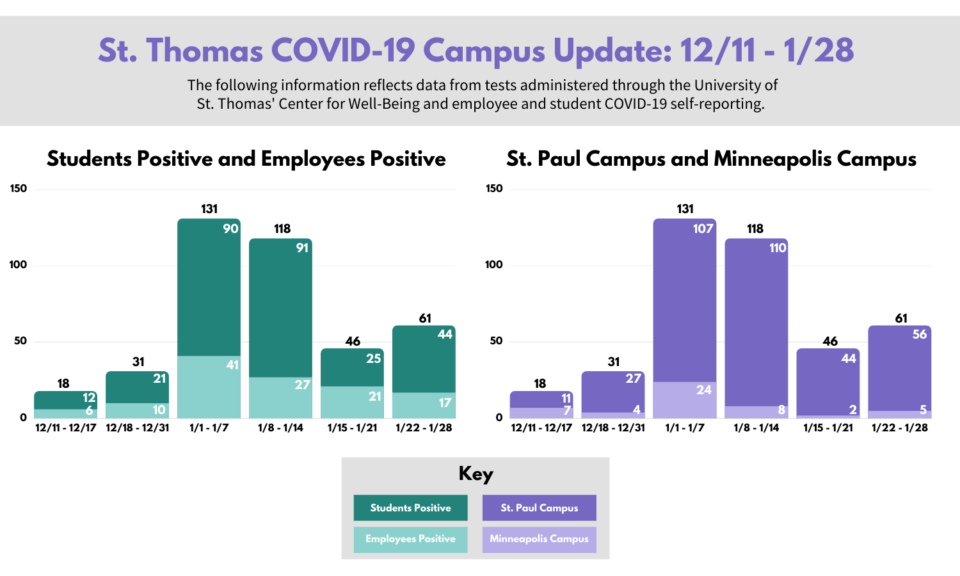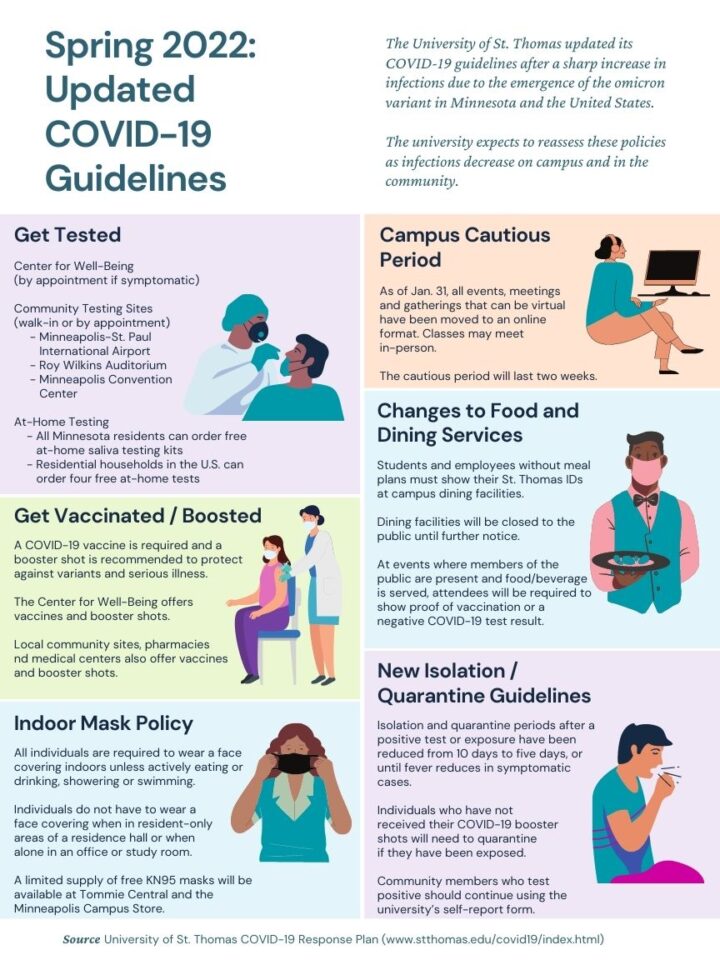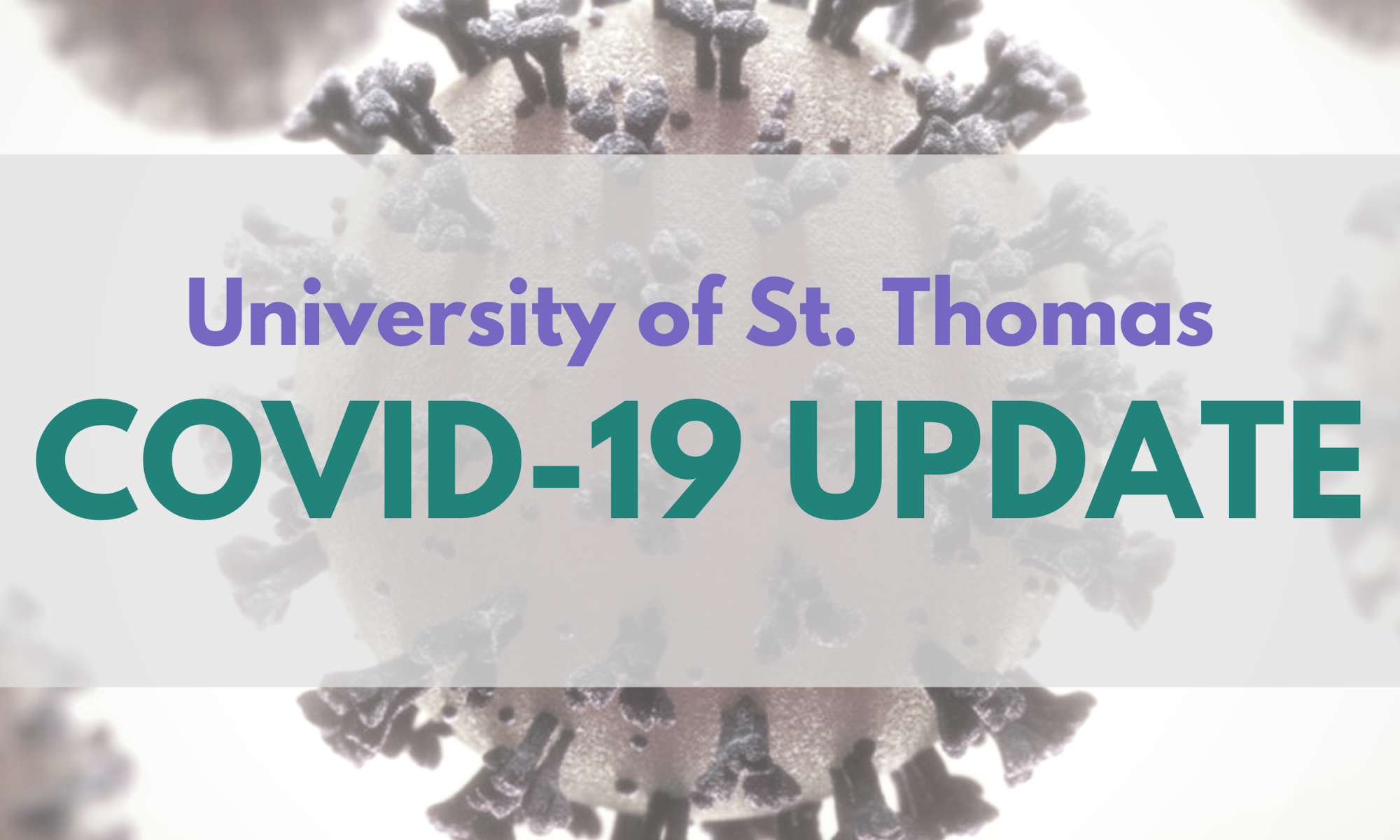
Sixty-one positive COVID-19 cases were reported to the St. Thomas Center for Well-Being for the week ending Jan. 28. The university-wide vaccination rate is 91.2%, with 94% of employees and 90.4% of students vaccinated.
Fifty-six of those positive cases came from the St. Paul campus while five came from the Minneapolis campus. Forty-four were students and 17 were employees.
Due to an increase in COVID-19 infections across the U.S. leading up to the spring semester, the university has updated its protocols to keep the community as safe as possible.
“The plan is to really welcome students back for the spring semester in the easiest way,” Executive Director for the Center for Well-Being Luis de Zengotita said.
For the first two weeks of the spring semester, starting Jan. 31, the university has implemented a campus cautious period. This entails that all events, meetings and gatherings that can be virtual should move to an online format.
“We are really hoping for those first two weeks as people come back to settle in, keep kind of a pause on COVID-19 cases in our community and see if we can kind of be a little more cautionary as students return from wherever they are coming from,” de Zengotita said. “Given Omicron, and it being everywhere, it’s just best to be a little cautious.”
For classes, students can see its current lecture status via Class Finder on Murphy Online.
As of Jan. 31, the COVID-19 vaccination is now required amongst all students, faculty and staff and conscientious exemptions are no longer an option. Those seeking an exemption must have a written religious or health necessity.
“The individual must share their vaccination status or have an approved religious or medical exemption. If a student doesn’t have any of those by Feb. 21, there will be a hold on their registration,” de Zengotitia said.

All students, faculty and staff are required to wear a tight-fitting face-covering inside at all times and outside when physical distancing is not possible.
Higher-grade face coverings such as KN95, K95 and K94 masks, or double masking are highly recommended by the university. St. Thomas will supply a limited number of KN95 masks at TommieCentral and at the Minneapolis Campus Store.
“This isn’t supposed to be a supply for the entire semester, rather giving people their first high-quality mask that they can use,” de Zengotita said.
The university is highly advising booster shots before returning to campus.
“The Center for Well-being is having clinics at least three days a week for the next three weeks and will continue to have clinics throughout the entire spring semester,” Vice President of Student Affairs Karen Lange said.
Students can schedule appointments on myHealthPortal.
Per Minnesota Department of Health guidance, the campus is reducing the isolation and quarantine periods from 10 days to five days. For community members who are not boosted, a five-day quarantine is required after exposure. Individuals that are boosted are not required to quarantine after exposure but should wear a mask around others for 10 days.
“For quarantine, day zero is the last day of exposure to the individual who tested COVID positive. If you are not current with your vaccines (boosted or fully vaccinated and waiting to be eligible for a booster), the first day that you develop symptoms is your day zero for isolation, and you must isolate for five days,” Lange said.
Following a positive COVID-19 test, individuals who are asymptomatic should isolate themselves for five days. Those who are symptomatic should isolate themselves for five days or until their fever subsides. After leaving isolation, a mask is recommended for five additional days.
For more information on isolation and quarantine periods, see this flowchart.
Dining Services is also trying something new, closing its facilities to the public until Feb. 28. Students and employees without meal plans must show their St. Thomas ID to get into dining facilities.
In regards to athletic events, as of Jan. 26, the university requires proof of vaccination or a negative COVID-19 test for indoor athletic events.
The University Action and Response Team will continue to meet weekly as they consult with the Minnesota Department of Health on mitigation strategies. They are continuously following the guidelines from the CDC and making changes as they see fit.
“We hope that the mitigation strategies that we have in place keep our campus safe and healthy. We acknowledge that everyone is getting fatigued from the mask-wearing and hope that it won’t be too long before things can return to normal on campus,” Lange said.
Annabelle Wiskus can be reached at wisk9881@stthomas.edu.


